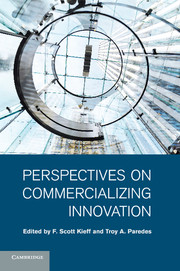Book contents
- Frontmatter
- Contents
- Contributors
- Dedication
- Acknowledgments
- Introduction
- Part I Perspectives on Theories of Intellectual Property
- Part II Perspectives on the Problems of Anticommons and Patent Thickets
- Part III Perspectives on Finance and Commercialization
- 10 Patents as Options
- 11 Access to Finance and the Technological Innovation
- 12 The Decline of the Independent Inventor
- Part IV Perspectives on the University Innovation
- Part V Perspectives on International Considerations
- Index
- References
11 - Access to Finance and the Technological Innovation
A Historical Experiment
from Part III - Perspectives on Finance and Commercialization
Published online by Cambridge University Press: 05 December 2011
- Frontmatter
- Contents
- Contributors
- Dedication
- Acknowledgments
- Introduction
- Part I Perspectives on Theories of Intellectual Property
- Part II Perspectives on the Problems of Anticommons and Patent Thickets
- Part III Perspectives on Finance and Commercialization
- 10 Patents as Options
- 11 Access to Finance and the Technological Innovation
- 12 The Decline of the Independent Inventor
- Part IV Perspectives on the University Innovation
- Part V Perspectives on International Considerations
- Index
- References
Summary
What role does access to finance play in the adoption or commercialization of new technologies? There are two answers to this question: no role at all; or, a large role, but its extent cannot easily be determined. The first answer assumes that capital markets are efficient: Any innovation that is not adopted must have promised a risk-adjusted rate of return below the prevailing interest rate. The second answer assumes that there are imperfections in capital markets, but that determining their precise impact on innovation is difficult as a practical matter because technologies that are not adopted or commercialized are difficult to observe. Moreover, even when we identify innovations that have been bypassed, we cannot know for sure whether they were bypassed because of an imperfection in the capital market or because that innovation was unattractive to investors for any number of reasons.
This chapter offers an answer to the question of the role of finance in the process of innovation by employing history as a laboratory. I look at the adoption of a particular set of technologies – those associated with the mechanized production of cotton cloth in the late 19th and early 20th centuries – in two countries where those technologies had been slow to disseminate until that time, Brazil and Mexico.
- Type
- Chapter
- Information
- Perspectives on Commercializing Innovation , pp. 327 - 358Publisher: Cambridge University PressPrint publication year: 2011

